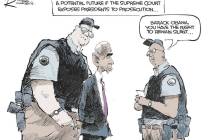Asset forfeiture
Seven years ago, the federal Civil Asset Forfeiture Reform Act was passed by Congress and signed into law to rein in government seizure abuses. A current case in Wyoming could indicate that reforms didn't go far enough.
Gillette resident Jeff Doles used to sell hundreds of pipes and water bongs from his Hip Hop Hippies smoke shop. Mr. Doles told his customers the items were intended for tobacco use. Of course, many of his customers used the items to smoke marijuana.
That Mr. Doles never sold marijuana from his store was irrelevant to local cops. Authorities viewed his business as a collaborator in the illegal drug trade, and they charged him with one count of conspiracy to deliver drug paraphernalia and two counts of possession with intent to deliver drug paraphernalia. Along the way, police seized 330 pieces of merchandise from Mr. Doles' store in two separate raids.
The case should have been closed when a jury acquitted Mr. Doles on all counts. Instead, prosecutors filed for civil forfeiture with a different judge in an attempt to keep the seized merchandise. When the judge granted the request, police raided Mr. Doles' store that very same day and took the rest of his goods, some 2,500 more items, putting him out of business.
How could this happen? In criminal proceedings, defendants enjoy due process rights, a presumption of innocence, and protection against double jeopardy. The burden is on prosecutors to prove guilt beyond a reasonable doubt.
But civil forfeiture laws force defendants to prove their property is innocent to get it back. In many states, including Nevada, authorities can take property if they merely suspect that it was used in the commission of a crime.
It's frightening that even after a criminal jury determined Mr. Doles' property was not drug paraphernalia, Wyoming prosecutors were able to keep their stash by finding a single judge who disagreed. After Mr. Doles' acquittal, Gillette Police Chief Rich Adriaens made this chilling comment: "Just because six people (the jury) found someone not guilty doesn't mean the crime didn't occur."
Mr. Doles is still fighting to get his property back, but the law isn't on his side. Because of that, Congress might have to look at reforming the Civil Asset Forfeiture Reform Act. Those who gain wealth through criminal activity should have their assets taken away. But those who have never been found guilty of a criminal offense shouldn't have to go to court to recover possessions that never should have been taken in the first place.























